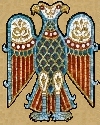 Byzantine Paganism
Byzantine Paganism

 Byzantine Paganism
Byzantine Paganism

FAQ -
Frequently Asked Questions
Click on a title below to visit a section of the Byzantine Pagan site:
![]()
Home
~
History ~
Heroes
~
Rituals ~
Priesthood
Documents ~
News
~
Forum ~
Shop ~
Links
~
FAQ
![]()
|
Q: Is this for real? The Byzantine world was CHRISTIAN! A: Even though the Byzantine world was Christian,
Classical Pagans continued to exist in the Eastern Roman Empire right up to, and
beyond, the fall of Constantinople in 1453 AD. This site is dedicated to the
Classical minority that continued the practice of ancient religion and
philosophy as best they could in a world dominated by the Church. Q. How can you possibly use the term "Byzantine Pagan?" There was no such thing, and the word "Byzantine" is a totally modern word! A: The word Byzantine IS modern... what we now
call the Byzantine Empire, or Byzantium was in fact the Eastern Roman Empire.
Rome continued in the East for centuries - and the "Byzantines" considered
themselves to be Romans until their capital city, Constantinople finally
fell in 1453. What we are calling "Byzantine Paganism" for convenience
here is more accurately "Late Classical Religion," or the pagan religions
as they were practiced during the end of the Classical world and the beginning
of the Medieval world. We use the modern term so the modern public will know what we're talking about. Q: Why on earth would anyone do this?? The Byzantine Empire is pretty much the poster child for the persecution of Pagans. For many modern pagans it is difficult to even use "Byzantine" and "Pagan" in the same sentence! A: While the history of Classical Religion
during the Byzantine era is overall one of decline, it is also a history of
survival, hope, and ultimately of rebirth. While it is true that Paganism was
forbidden and persecuted during this time, it never was completely destroyed.
The survival of Rome in the East even meant that the ancient knowledge was
preserved, and survived to the modern world.
A. Because modern pagans today are still starting where the Byzantines left off. We have no temples. Our religious traditions are no longer a part of common society. We are left to explore on our own, continue on our own, practice in our homes, and rebuild community as best we may. There is something practical to be said for continuing our spiritual tradition from where it "left off" in history!
A. There were many changes to Classical religion as it worked to adapt to confrontation and competition from other religions. The Emperor Julian instituted many changes to the public priesthoods to make them more meaningful and relevant in a changing world. Sacrifice was abandoned, and the private rites became more important. In short, the Classical Religions began to make the modifications that would be necessary for becoming one of many available religions, instead of being the ONLY religion. Those changes are important for us today, because we will never again see a world where there is only one type of religious faith.
A. Not at all. This "Later" form of Classical Religion is something that may be practiced along any other form of ancient religion. Basically this path is the adaptation of ancient spirituality to more modern challenges - so it certainly can be connected to many different views and practices.
A: Not at all. If anything, it helps to resolve the ancient conflicts. The Byzantine Era saw the birth and death of the idea that a single religion can again control the entire world... and of the idea that earthly success of an Empire equals divine favor for a religion. When Constantine won the battle of the Milvian Bridge against his Pagan rival, it was seen as a sign that Christianity was more powerful than the Gods. But the rise of Islam shook the foundations of such ideals... from the Byzantine era onward no single religion has ruled the world again. All religions have become more equal since that time. Today, both Paganism and Orthodox Christianity have had their periods of triumph and reversal, and have the opportunity to coexist better than any time in history. Q: Can one be both a Byzantine Pagan and a Christian? A: Both faiths overall would traditionally say no, but even so this has been done in the past. Certainly most of the people that held on to the ancient faiths in the Byzantine period would have had attended Orthodox church at times, and found what spiritual connection they could in that realm. Also the Christian world could never abandon its cultural roots, meaning that even those of Orthodox faith had to share pagan knowledge. Both paths were somewhat reconciled in Philosophy as well. Q: What makes this type of ancient religion unique? A: Classical religion during the Byzantine Era had many unique aspects. First, it incorporated Byzantine art and religious styles, such as the use of icons. It was also personal based more than a public or community faith, so that it is easily done by the individual at home. It also incorporated philosophy and even some magical practices, as the things "frowned upon" by the church were marginalized together. Certainly Classical religion at this time was forced by circumstances to abaondon traditional forms, leaving room for new creation in our own times. |
© Copyright Byzantium Novum, 2024